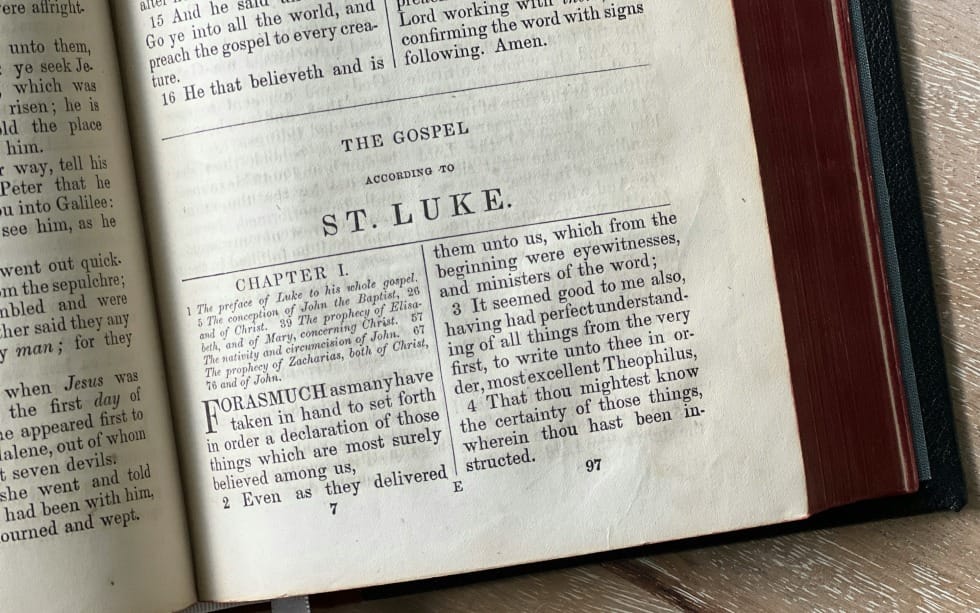The Messiah Is Almost Here
Have you ever wondered why God communicates the way he does? Instead of sitting on a grand physical throne on some spot on earth so that people throughout the centuries could see and hear him, he chose to make himself known in other ways.

Luke 1:1-38
Today's Scripture Passage
A Few Thoughts to Consider
Have you ever wondered why God communicates the way he does?
Instead of sitting on a grand physical throne on some spot on earth so that people throughout the centuries could see and hear him, he chose to make himself known in other ways. For generations, prophet after prophet spoke of Christ’s descent to earth. What’s fascinating is that just as the last few books of the Old Testament prophecy about what is to come, the opening books of the New Testament fulfill what has been said.
The first of these fulfillments starts with the person of John the Baptist—as told in the first chapter of Luke. Interestingly, the Book of Luke has the most verses of any of the four gospel narratives. In fact, if we combine the books of Luke and Acts, Luke writes 2,157 verses of the New Testament, while the totality of the Apostle Paul’s writing falls just behind at 2,032 verses.[1] If we are to read the four gospels as a chronological account, the real beginning is in Luke 1. There, verses 1-4 give us the purpose behind Luke’s writing. He says,
1 Many have undertaken to compile a narrative about the events that have been fulfilled among us, 2 just as the original eyewitnesses and servants of the word handed them down to us. 3 So it also seemed good to me, since I have carefully investigated everything from the very first, to write to you in an orderly sequence, most honorable Theophilus, 4 so that you may know the certainty of the things about which you have been instructed.
While Luke doesn’t discuss his well-educated background as a physician, it’s obvious he pens a careful account and lays a meticulous case for the person of Jesus. Writing on these verses, Darrell Bock notes, “Theophilus is probably a believer, who as a Gentile, a non-Jewish Semite, or a God-fearer may well be wondering what he is doing in an originally Jewish movement that has faced so much rejection from the Jews. Does he really belong, and is salvation really found in that movement? Is this what God is about?”[2] As the gospel of Luke and the Book of Acts unfolds, it’s clear what this answer is. The gospel is for everyone.
“Every unit in Luke’s Gospel,” Bock notes, “challenges us to respond to Jesus. Starting with categories of Jewish hope like Messiah, it reveals who Jesus is.”[3] Luke 1:1-38 details the angel Gabriel's announcement of John the Baptist's birth to Zechariah. So, right from the opening chapter, the stitching together of the Old and New Testaments begins. John is identified as the "voice of one crying out in the wilderness" from Isaiah 40:3 and the messenger who prepares the way in Malachi 3:1. Later, Jesus linked John to the prophecy of Elijah's return in Malachi 4:5-6, stating that John came in the spirit and power of Elijah. John's ministry of repentance and baptism directly prepared the people for Jesus' arrival and mission.
Luke 1 also gives us the foretelling of Jesus' birth to Mary. Gabriel tells Zechariah that his wife, Elizabeth, will bear a son who will prepare the way for the Lord, despite her old age. Later, Gabriel visits Mary, a virgin engaged to Joseph, and announces that she will conceive a son by the Holy Spirit, who will be called Jesus and reign forever. How? Verse 37 says, “For nothing will be impossible with God.” For generations, the prophets said a Messiah would come. Now, he is only a few months away from entering this world.
A Meditation to PRAY
Praise | Lord, I praise you for your faithfulness and the fulfillment of your promises, as demonstrated in the birth of John and the announcement of Jesus. I glorify you for the miraculous works you have done and the grace you have shown your people. Thank you for choosing Mary and for the example of her humble obedience.
Release | Lord, I release my doubts and fears into your hands, trusting in your divine plan and timing. Help me to let go of any reservations I have about your promises and your power. I surrender my will to yours, just as Mary did when she accepted your word.
Ask | Lord, I ask for a heart of faith like Mary, who believed in your word even when it seemed impossible. Give me the strength and courage to say "yes" to your will in my life. Fill me with your Holy Spirit so I may walk in your ways and fulfill your purposes.
Yield | Lord, I yield to your sovereignty and perfect plan for my life. I trust your wisdom and guidance, knowing that you work all things for good. Help me to remain steadfast in my faith and to always respond to your calling with a willing and obedient heart.
A Challenge to Act Like Christ
Through the Book of Luke, we know what the gospel is all about. It’s more than just a nice story or plan to deliver us from Hell. As Jonathan Pennington writes, “The gospel includes the message of peace, the offer of forgiveness of sins through repentance, the promise of inheriting eternal life, the invitation to enter the kingdom of God, and the joy of being with Jesus as a disciple. In all of this, the gospel is good news because it announces the grace and peace that have now come to sinners in Jesus Christ.”[4]
Like Luke, each of us who has placed our hope in Christ has the opportunity to share him with others. Luke wasn’t a pastor or seminary professor, he was a physician. He wasn’t anyone particularly special, but he pointed countless people to someone who was.
If you are fearful, like Zechariah and Mary, take heart. The same God who was with them is with you today. He knows your limitations, your quirks, and your insecurities. But if you let him, he can use you to be a mouthpiece of his good news to others.
*Unless you specify otherwise, comments and questions you ask may be featured in upcoming podcast episodes.
[1]Darrell L. Bock, Luke, eds. Terry C. Muck, The NIV Application Commentary. Accordance electronic ed. (Grand Rapids: Zondervan, 1996), 17.
[2]Darrell L. Bock, Luke, eds. Terry C. Muck, The NIV Application Commentary. Accordance electronic ed. (Grand Rapids: Zondervan, 1996), 23.
[3]Darrell L. Bock, Luke, eds. Terry C. Muck, The NIV Application Commentary. Accordance electronic ed. (Grand Rapids: Zondervan, 1996), 17-18.
[4]Bryan Chapell, eds. Gospel Transformation Study Bible Notes. Accordance electronic ed. (Wheaton: Crossway, 2013), paragraph 4597.





